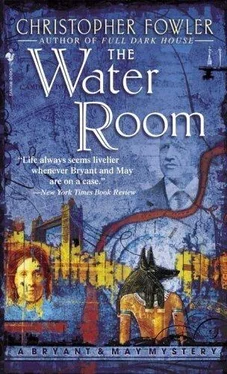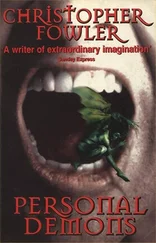Christopher Fowler - The Water Room
Здесь есть возможность читать онлайн «Christopher Fowler - The Water Room» весь текст электронной книги совершенно бесплатно (целиком полную версию без сокращений). В некоторых случаях можно слушать аудио, скачать через торрент в формате fb2 и присутствует краткое содержание. Год выпуска: 2006, Жанр: Детектив, на английском языке. Описание произведения, (предисловие) а так же отзывы посетителей доступны на портале библиотеки ЛибКат.
- Название:The Water Room
- Автор:
- Жанр:
- Год:2006
- ISBN:нет данных
- Рейтинг книги:5 / 5. Голосов: 1
-
Избранное:Добавить в избранное
- Отзывы:
-
Ваша оценка:
- 100
- 1
- 2
- 3
- 4
- 5
The Water Room: краткое содержание, описание и аннотация
Предлагаем к чтению аннотацию, описание, краткое содержание или предисловие (зависит от того, что написал сам автор книги «The Water Room»). Если вы не нашли необходимую информацию о книге — напишите в комментариях, мы постараемся отыскать её.
The Water Room — читать онлайн бесплатно полную книгу (весь текст) целиком
Ниже представлен текст книги, разбитый по страницам. Система сохранения места последней прочитанной страницы, позволяет с удобством читать онлайн бесплатно книгу «The Water Room», без необходимости каждый раз заново искать на чём Вы остановились. Поставьте закладку, и сможете в любой момент перейти на страницу, на которой закончили чтение.
Интервал:
Закладка:
‘They turned a blind eye to our midnight madrigals, but drew the line at our attempts to summon Beelzebub. Now they’re planning to build a mall on the site. Have you noticed that every London building eventually becomes a shoe shop? Camden is already the bad-footwear capital of the world. Old gods are no match for new money. But it’s nice to be in a real chapel. I had a bash at deconsecrating the area of worship this morning, but I’ve run out of salt. Spiritual decommissioning isn’t a straightforward process. The guidebooks all differ. Some people say you’re supposed to return the sanctified altar sheath to a church. Others simply recommend a lick of paint. Wendy, our organist, says you can sing hymns backwards over it, but frankly she has enough trouble playing forwards. I think we’ve lessened the aura of sanctimonious monotheism, but we can’t get rid of the damp. And the local drunks have a habit of weeing in the porch. Is that why Christian temples reek of rot, I wonder? Who’s your friend?’
‘This is David, honorary junior police officer for today. He lives nearby.’
‘Come in.’ Maggie took his hand. ‘Are you a believer?’
‘In what?’ asked the boy.
‘The darker arts, the lost spirituality of a doomed and wandering humankind.’
David stared at her as if she was mad.
‘Do you at least try to keep an open mind?’
‘Don’t know.’
‘That’s the best we can expect these days, I suppose. Come through.’ She led the way between the oaken pews of the dingy main hall to a small paper-strewn office at the rear. Silver chains, icons and baubles hung from her bosom like miniature wind-chimes. Maggie’s eyes closed to crescents when she smiled, which she did often and broadly, revealing strong white teeth. Bedecked in bracelets, with tortoiseshell slides and two pairs of spectacles in her fiery red hair, the diminutive witch was as merry as a Christmas tree.
‘What’s that extraordinary odour?’ asked Bryant, sniffing the air.
‘My new herbal incense. Can you smell lavender?’
‘No, it’s more like burning ants.’
‘Oh, that. Yes, something’s living in the rafters. I’ve put down poison, but I think it’s eating through the wood. If only Crippen hadn’t disappeared during the move.’
‘How strange. I just found a cat called Crippen. At least, that’s what I named it.’
‘Small, black and white, male? Piece missing from the left ear? A bit squiffy-eyed?’
‘Exactly so.’ Bryant was delighted.
‘Benign fate! You’ve found my familiar. That means his aura is intact.’
‘Perhaps, but his toilet training leaves much to be desired. I’ll bring him round later.’
Maggie handed out some brochures. ‘We’re on a membership drive. If you know anyone who’s interested in the occult and can handle a hod, we need some strong hands to help us restore the place.’ A huge bearded man suddenly lurched into the doorway. ‘I was just making tea for an old friend of yours.’
‘Arthur, dear fellow! How delightfully efficacious!’ Raymond Kirkpatrick, English-language professor, gripped Bryant’s hand and pumped it hard. Tall and stooped, he appeared at first to be covered in a light shower of grey dust, and on closer inspection, was. ‘I’m helping Margaret clear out her reliquary. I thought we might find something of epistolary antiquarian value, but so far all I’ve found is several dozen copies of Razzle, presumably tucked away by the choirboys.’
‘Professor Kirkpatrick is one of England’s leading experts in semantics and cryptography,’ Bryant explained to the dumbfounded boy. ‘He likes words.’ He decided not to describe the bizarre circumstances that had led Kirkpatrick to be dishonourably discharged from the Met. The professor had once dated a six-foot Zimbabwean girl, who had, to his shame and horror, turned out to be fifteen, false documents having been provided by her parents in an effort to marry her off. The Home Office had branded him a paedophile and arranged his expulsion, and, although the subsequent investigation had exonerated him of everything but poor judgement, Kirkpatrick had become an unemployable outcast. Every time the PCU used him, Bryant logged Kirkpatrick’s invoice under an assumed name. He hated seeing a good mind go to waste.
‘Mr Bryant usually brings me his palaeographic conundrums for reinterpretation,’ Kirkpatrick explained, ‘although, alas, I fear his recent reluctance to employ my services suggests that the age of the erudite criminal has passed along with the locked-room mystery, clean public toilets and a quality postal service.’
‘I think we have some of the information you’re after,’ said Maggie, pouring ginger tea for everyone as Bryant snatched a recruitment brochure away from David. ‘John told me about the man who died in Balaklava Street, and it doesn’t come as a surprise.’
‘Oh, really? Why?’
‘Because it appears to be a hot spot of psychic activity. There have always been strange stories surrounding the area.’
‘What kind of stories?’
‘It’s long been considered unhealthy to live there because of bad humours rising from the ground. In the fifties, it suffered from sudden mists and smogs that sprang up from the drains and vanished just as quickly. It’s in a bit of a dip, you see. A vale. Some are still marked in London, like Maida Vale. Others have been forgotten, like the one in Kentish Town. It’s a very old area. Camden was a late arrival in the neighbourhood, 1791 to be exact, and yet they managed to come up with plenty of local legends, ghosts, witches and murderers. You can imagine how many more myths Kentish Town built up in the preceding centuries.’
‘The name is derived from Ken-Ditch, ’ Kirkpatrick pointed out, ‘meaning the bed of a waterway.’
‘The town, combined under its original alias with St Pancras, has been here for well over a thousand years,’ Maggie pointed out. ‘An entire millennium of harmful atmosphere. Don’t forget that it grew up around a rushing river. The water turned mill-blades and provided the lifeblood for its residents. A great many ancient documents refer to the “calm clacking of the mills”. Now all we hear is the wail of police sirens. And the river has long been sealed underground.’
‘This lad’s father works for the water board. He knows a fair bit about it,’ said Bryant. ‘Part of the Fleet, yes?’
‘From the Saxon fleete or fleot, a flood, or the Anglo-Saxon fleotan, to float,’ Kirkpatrick intoned.
‘It runs down to the Regent’s Canal, but nobody’s sure exactly where it flows,’ added Maggie. ‘There’s a run-off around here called Fog’s Well, for obvious reasons. Long gone now.’
‘Did you have any luck with my information?’ asked Bryant.
‘Your brief was a bit vague.’ She checked her notes. ‘Around 1840, the land was sold off in neat little plots that followed the rivers and meadow boundaries. Forty years later the plans had changed, with more roads and houses being squeezed on to the original layout. According to my contact at Camden Council, in the 1960s the local authority drew up a new design for the area, a concrete wasteland of tower blocks. Thankfully, it never came to fruition.’ She peered over her reading glasses. ‘Honestly, we spend so much time attempting to improve ourselves, taking self-help courses, going to the gym, trying to develop more meaningful relationships with one another, and yet we dismiss the other associations we need to support our fragile well-being.’
‘What do you mean?’
‘Everyone interacts with their location, Arthur. Where we live helps set the level of our happiness and comfort. The English have strongly developed psychological relationships with the landscape. They travelled so little that accents changed from one street to the next. There’s a famous Punch cartoon showing two locals throwing a brick at a stranger; that’s the nineteenth-century English for you-antipathy to outsiders. These days, our relationships with views, buildings, places, objects and strangers are virtually ignored. As a child, you probably had a place that made you happy-nothing special, a small corner of sun-lit grass where you kicked a ball or read a comic. As an adult, you search for an equivalent to that spot. Can you ever truly find it again?’
Читать дальшеИнтервал:
Закладка:
Похожие книги на «The Water Room»
Представляем Вашему вниманию похожие книги на «The Water Room» списком для выбора. Мы отобрали схожую по названию и смыслу литературу в надежде предоставить читателям больше вариантов отыскать новые, интересные, ещё непрочитанные произведения.
Обсуждение, отзывы о книге «The Water Room» и просто собственные мнения читателей. Оставьте ваши комментарии, напишите, что Вы думаете о произведении, его смысле или главных героях. Укажите что конкретно понравилось, а что нет, и почему Вы так считаете.












